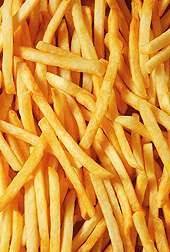Gene suppression can reduce cold-induced sweetening in potatoes

(Phys.org)—Preventing activity of a key enzyme in potatoes could help boost potato quality by putting an end to cold-induced sweetening, according to U.S. Department of Agriculture (USDA) scientists.
Cold-induced sweetening, which occurs when potatoes are put in long-term cold storage, causes flavor changes and unwanted dark colors in fried and roasted potatoes. But long-term cold storage is necessary to maintain an adequate supply of potatoes throughout the year.
Agricultural Research Service (ARS) scientists found that during cold storage, an enzyme called invertase causes changes in potato sugars—more accumulation of sucrose and a corresponding increase in the amount of glucose and fructose in tubers stored at very low temperatures.
At the ARS Vegetable Crops Research Unit in Madison, Wis., plant physiologist Paul Bethke, geneticist Shelley Jansky, and technician Andy Hamernik used a recently developed technology to show that decreasing the activity of invertase is sufficient to enable cold storage of potatoes without compromising the appearance of potato chips or the growth characteristics of the potato plants.
Bethke and his colleagues are using molecular tools to improve understanding of what is controlling the process of cold-induced sweetening. Potatoes are sensitive to their environment and highly sensitive to low temperatures, and respond to these temperatures by producing certain sugars called "reducing sugars," primarily glucose and fructose. When chips or fries are made from these potatoes, they tend to be dark-colored and bitter. The scientists' research paper in Plant Physiology provides a proof of concept that the invertase enzyme is critically important in the process.
However, invertase's level of importance has never been clear, because there are other biochemical steps that might also contribute, according to Bethke.
More information: Read more about this research in the October 2012 issue of Agricultural Research magazine.
Provided by United States Department of Agriculture
















